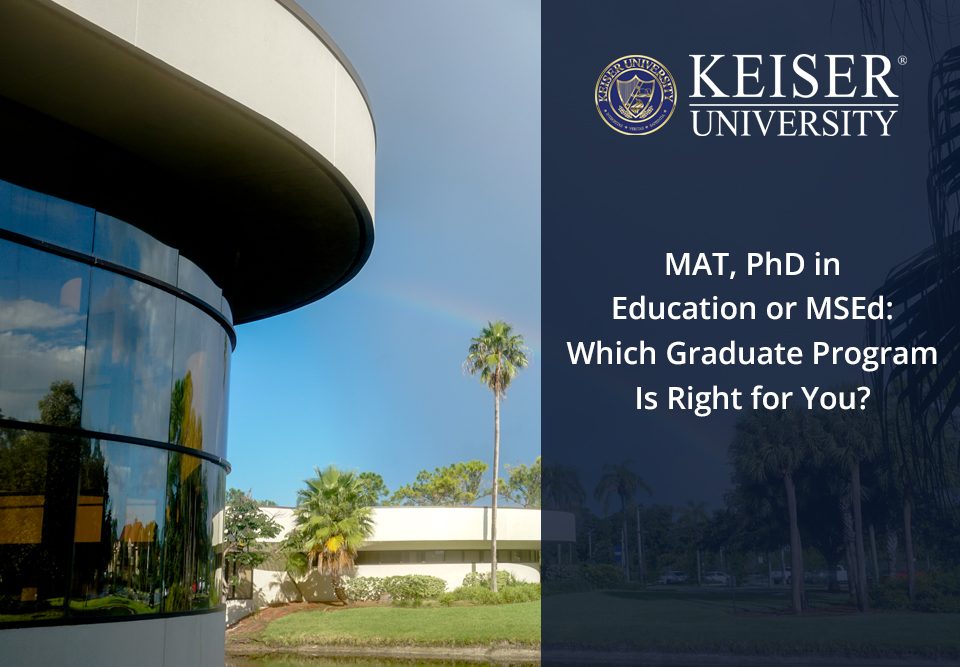Many say there is no higher calling than teaching. Indeed, it takes an extraordinary person to be a teacher and make a difference in their students’ lives. An advanced degree in education allows you to hone those critical skills and move your career forward. Having a graduate degree in teaching helps to increase your chances for higher pay and more career opportunities.
For teachers looking at graduate degrees, you’ll find there is more than one to consider. And the question is, which one is the best option? You can pick a Master of Arts in Teaching (MAT), a Master of Science in Education (MSEd), and a doctorate or PhD in Education. You should understand what sets each apart before making your choice.
Differences Between Graduate Degrees in Teaching
There are a number of advanced degree programs that can apply to education, but three that are consistent: MAT, MSEd, and a PhD, each with a different focus. That is the crucial element you should consider when choosing an advanced program for yourself.
Specialties
One thing that will stand out clearly as you research these degrees is specializations. A Master of Arts in Education program enhances your fundamental teaching skills. This degree program will make you a better overall teacher. You need a bachelor’s degree to enroll in an MAT program, but it doesn’t have to be in education.
While in the program, you might be able to work towards a subject specialty, as well, such as history, English, biology, or math. Some schools may ask you to choose a major specialization, such as social studies, and then a minor, like political science, to further focus your area of focus.
An MSEd degree program takes it a step further. This degree program moves you outside the classroom to focus on a specialization such as administration, child and adolescent development, and educating specific audiences. The goal isn’t to limit your options but expand them. Educators with an MSEd degree even work outside the standard educational system in the private sector, museums, research institutions, as well as healthcare. You will need a bachelor’s degree in a relevant course of study to enter an MSEd program.
A PhD is a terminal degree in education that you would work towards after getting your MSEd or MAT. It means a couple more years of schooling to get your doctorate and involves further specialization.
Credibility
Any of these three degrees would add credibility to your resume and improve your chances for career advancement as an educator. The main difference is in what path you hope to pursue. For example, if you are looking to be more of a high-ranking administrator for a school system or to do research, it might make sense to work towards a doctorate in education (EdD) or PhD.
First, you’ll need a master’s degree. Either an MAT or an MSEd degree looks great on a resume, but an MSEd program is more comprehensive. By entering an MSEd program, you are looking to not only improve your skills as a teacher but also to develop a specialty or move into an administrative position.
To potential employers, an MSEd degree says you have advanced teaching skills, but you also have studied curriculum design and administration.
Accreditation
Accreditation is something you want to consider regardless of the degree program. For example, Keiser University is accredited by the Southern Association of Colleges and Schools Commission on Colleges (SACSCOC). Accreditation ensures that the school meets the commission’s criteria to award certifications and degrees. A degree from a school that is not accredited holds less value with potential employers and may make it difficult (or impossible) to transfer credits in the future.
Certifications
A graduate degree allows you to tailor your education to suit your career goals. When you enter an MSEd program, you might consider specializations to hone your career along a select path, such as administration or leadership. Remember, the MSEd program is for students looking to expand their skills beyond the classroom and do not necessarily lead to a teaching certification. Certification and practicum are a large part of that effort.
MAT programs are about learning the fundamentals of teaching. As part of the graduate degree program, you will likely choose a subject matter as your focus, such as history or biology. They may offer certifications in your chosen subject; these programs often lead to state certification as a teacher.
Master of Arts in Teaching (MAT)
A MAT degree can help advance your career as a teacher, and you may choose a subject matter as your specialization, such as mathematics. This degree program is for teachers who want to work in a classroom day-to-day.
Curriculum of an MAT Degree
The curriculum in a MAT degree program will focus on improving your teaching skills and will cover pedagogical theory and methodology. An MAT program may also include hands-on classroom training as a student teacher.
Some coursework you might see in a MAT program includes:
- Theoretical Foundations of Education and Literacy
- Reading in the Content Area
- Design of Technology-Based Learning
You may also take courses related to your chosen specialty, such as Teaching Science in Secondary Grades.
Education Requirements
The exact education requirements may differ from school to school. However, you need at least a bachelor’s degree from an accredited institution. The degree does not necessarily have to be in education or a related field.
Master of Science in Education (MSEd)
The Master of Science in Education program is for teachers considering moving outside the classroom to research, specialty teaching, or educational leadership. It will give you a better understanding of teaching and its practices along with how to develop your curriculum and manage classrooms and education systems.
Some classes you might take in an MSEd degree include:
- Education Governance, Motivation, and Ethical Decision Making
- Psychological Basis of Education
With more comprehensive programming, there are many different specializations that you may be able to find if you are interested in pursuing a Master of Science in Education:
- Teaching & Learning
- Leadership
- Instructional Design & Technology
- Allied Health Teaching and Leadership
Education Requirements
The education requirements will vary. Some schools may require you to have a bachelor’s degree in education or a related subject from an accredited school. You might even consider this program if you already have a MAT. This will give you the administration skills to move beyond the classroom.
PhD in Education
A PhD is the highest degree you can get in education. It qualifies you for both administration careers and teaching in higher education. This degree is typically for those looking to enter into research or to be intellectual leaders in education.
Curriculum of a PhD in Education
The curriculum will vary significantly from program to program. Some courses you may see in a PhD in Education program include:
- Educating Future Teachers
- Qualitative Analysis
There may also be specialization in PhD programs such as:
Education Requirements
To enter a PhD program, you must have a master’s degree, preferably in some form of education. You would likely qualify for a PhD program with either an MAT or an MSEd degree from an accredited school if you meet any minimum GPA requirements.
The entry requirements will vary from program to program, though. Some schools may require you to have certain specializations and a certain number of classroom hours. You should review the acceptance requirements for any doctoral program you are considering.
Doctor of Education / Education Specialist (EdD/EdS)
Similar to a PhD, an EdD degree is another option for a terminal degree in education, while an EdS is a post-graduate certificate degree that can be obtained more quickly. As evident in the names, both of these degrees are specialized for education and cater to students who are looking for a more practical or practitioner-based program where research and improvements would occur more directly to the institution/classroom.
Curriculum of EdD/EdS
As with other programs, your specific curriculum will depend on your goals and chosen program. You can expect high-level education topics like:
- Ethical & Legal Issues in Education/Leadership
- Curriculum: Advanced Theory and Research
EdD and EdS are types of degrees, so they can be specialized for almost any need:
Education Requirements
As with any post-graduate degree, a graduate degree is considered a prerequisite. Most students will have earned a graduate degree in education, but if you are trying to break into this field there may be options available.
Unlike a PhD, completing a dissertation or thesis is often not required for an EdD/EdS. Doctor of Education programs usually favor a more practical project for completion while a EdS may only require coursework and no large final project.
Which Degree Program Is Right for You?
If you want to advance your career in education, then getting your master’s degree is a step in the right direction – but which one is right for you? That depends greatly on your career priorities. If you are sure you want to stay in the classroom or don’t already have a degree in education, then you might want to enroll in an MAT program. This will hone your classroom skills and help you specialize in a specific subject matter.
If you already have a degree in education or a related field, or even if you have an MAT degree, your best option might be an MSEd program like the one offered at Keiser University to take you to the next level as an educator. There are six MSEd program options available, covering specializations like Teaching & Learning, Technology, and Leadership.
Keiser University has multiple campuses in Florida and an affordable tuition plan. The MSEd program requires 36 graduate semester credit hours and includes a capstone project. The goal is to provide you with the best practices for teaching in and out of the classroom. While a student of the MSEd program, you will learn to design and evaluate curriculum and instruction processes, manage classrooms, perform learning assessments, and more.
Graduates for the Keiser University MSEd program go on to become:
- Education managers
- Trainers
- Tutors or coaches
- Education management analysts
- Department heads
- Curriculum specialists
- Education directors
Once you complete your master’s degree in education, you can decide if studying to get your PhD in Education, Doctor of Education, or Education Specialist is a logical next step based on your career goals.
Are you ready to advance your education by enrolling in a graduate program? Then consider what the Keiser University Graduate School has to offer. We are here to help you achieve your educational and professional goals. Our graduate programs include master’s, specialist, doctoral, and certificate programs with online options in a wide range of fields – including education.
At Keiser, we are fully committed to you and pride ourselves in putting our students first. We offer small class sizes with personalized instruction and are here to answer your questions. Request info today to find the right program for you!






 The instructors at Keiser University impacted my life. They believed in my ability to become a great graphic designer, regardless of how I felt about my skills. KU helped to prepare me for the real world and got me to where I am today.
The instructors at Keiser University impacted my life. They believed in my ability to become a great graphic designer, regardless of how I felt about my skills. KU helped to prepare me for the real world and got me to where I am today.
